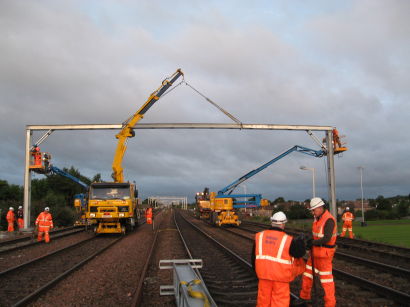THE chances of electrification of the Great Western Main Line and several key routes in the north west in the foreseeable future appear to have dwindled to almost zero. The House of Lords has been told that the national financial situation poses difficulties.
Lord Attlee, answering a transport question from Lord Faulkner, said: "My Lords, we are committed to High Speed 2, but the noble Lord will understand the problems with expenditure on electrification in the current economic climate."
He also told the House that additional carriages were 'desirable', but that there was an 'affordability problem' with them as well.
The Department for Transport has already been required to slash £683 million from its budget, while early electrification is also being questioned by the chief executive of Network Rail.
Iain Coucher told Railnews that if the Thameslink rolling stock programme is delayed, and with the current question marks over Intercity Express, electrification might not be worthwhile because there could be no electric trains available for these routes anyway.
He said : "We have to face the fact that rolling stock orders are now looking less certain. Intercity Express has been placed in question by Government, at least in its present form, and we haven’t seen the promised report on that yet in any case, which is looking at the value for money question once again.
“The new Thameslink rolling stock, which was to have been ordered in two phases, is also being re-examined. If the larger second phase, in particular, didn’t go ahead as planned, then we won’t have Class 319 units freed up from Thameslink to cascade to Great Western suburban and the north west. And if we don’t have the 319s to run to Oxford and Newbury, what’s the point in electrifying those lines so quickly?
“For that matter, we should be questioning whether we should be going ahead for now with all our plans to lengthen platforms to 12 cars, if we won’t be getting the 12-car trains just yet.”
It has also been speculated that electrification could be cut back, rather than postponed altogether, but Mr Coucher points out that there are problems with that approach as well.
“Take Great Western. We know Airport Junction to Maidenhead is to be electrified for Crossrail, and there are plans to take the wires on to Reading. But then what? Let’s say we are asked to go as far as Didcot and Oxford. We’ll be asked to keep the cost per kilometre down to where it would have been had we gone through to Bristol and Swansea, but railway engineering doesn’t work like that.
“We would lose the economies of scale. The Swansea project would have involved factory trains working steadily down the route, with the piling gangs in advance of them. But we won’t be so efficient doing shorter sections, however hard we try. The cost per kilometre will be higher. And, as I say, what’s the point, at least for now, of committing funds to electrifying routes which may not have any electric trains for the time being ?"
More details of Mr Coucher's exclusive assessment of rail industry prospects are published today in the latest print edition of Railnews.


